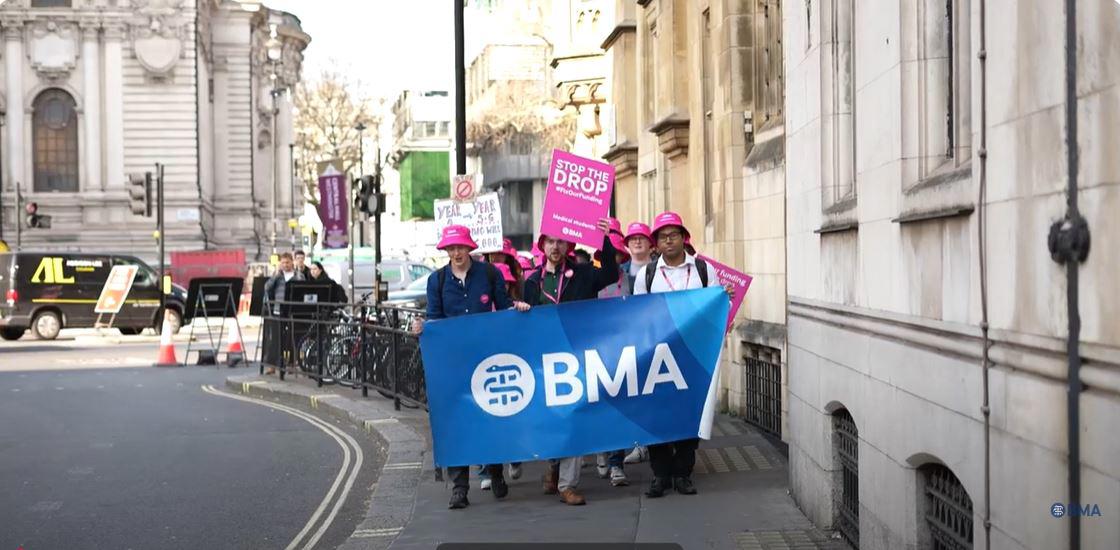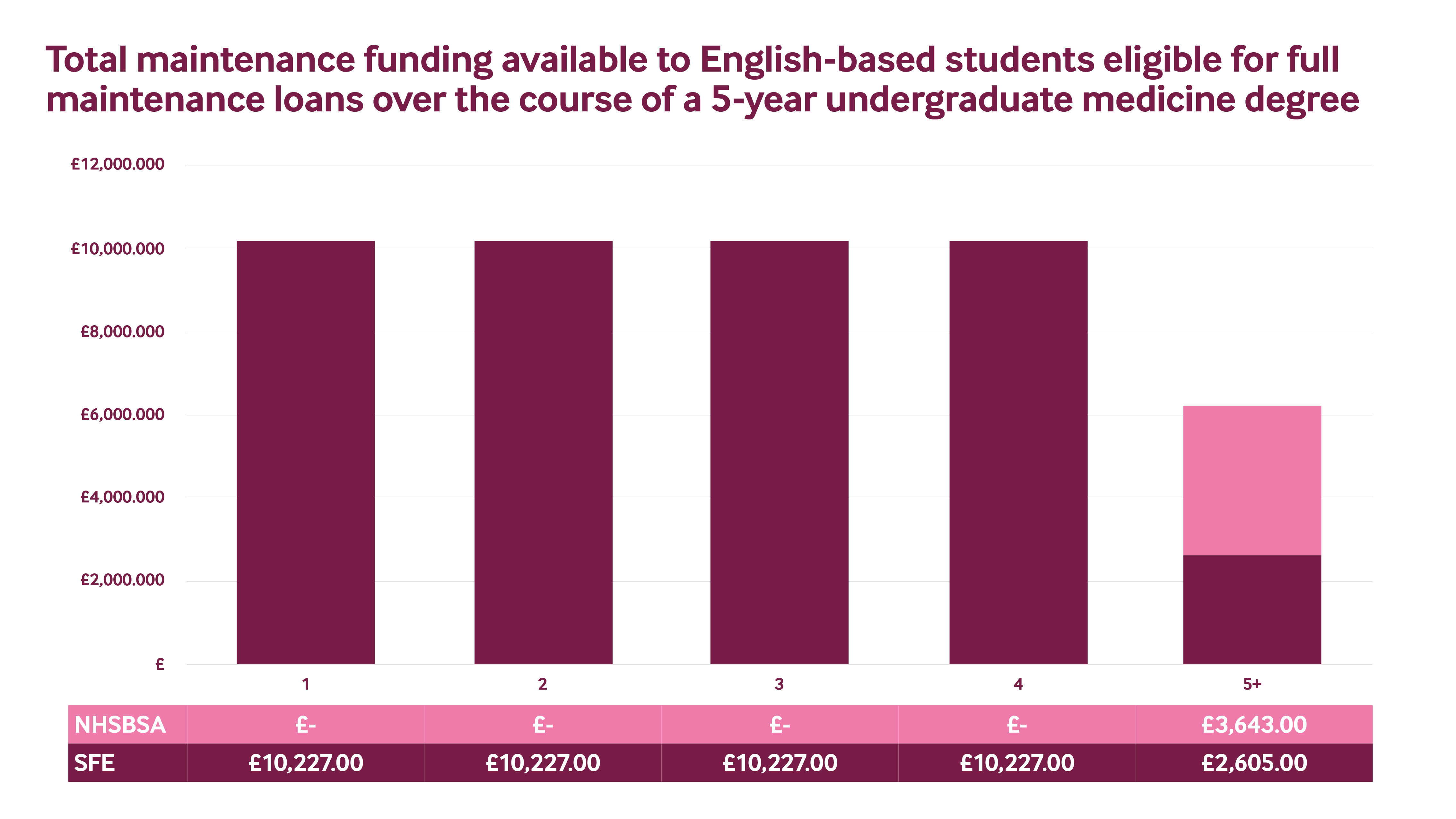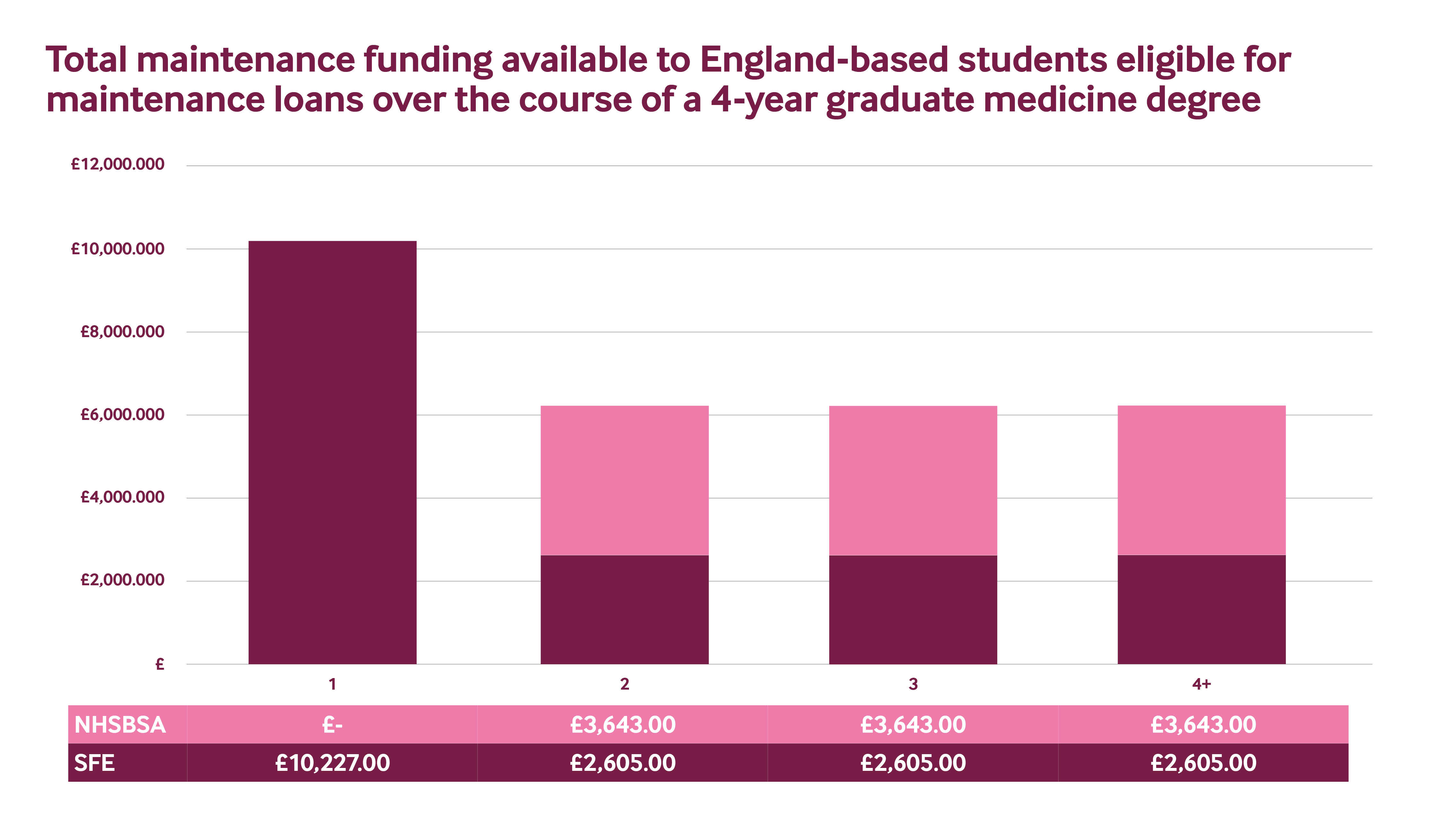What is #FixOurFunding?
FixOurFunding is our campaign to address poor medical school funding for English domiciled medical students, who are typically eligible for the lowest funding of any UK nation.
Inadequate funding is causing real financial hardship. In our 2025 medical student finance survey, 90% of students told us the funding they receive doesn’t cover their day-to-day costs. And this is jeopardising their studies, with almost half of those who responded to the survey telling us they’ve considered leaving their courses and quitting medicine.
We’re calling on the Government to step up and ensure better financial support for students through all their years of study.
- Ensure both undergraduate and graduate students are eligible for full SFE maintenance loan provision for all years of study.
- Improve access to funding via the NHS Bursary, including improving the claims process, and exploring new sources of funding.

What does the new LLE mean for medical students?
The newly announced Lifelong Learning Entitlement (LLE), for English domiciled students starting their courses from September 2027, opens access to tuition fee loans to students on both graduate and undergraduate medical degrees.
This is currently costing graduates on 5-year undergraduate courses approximately £38,000 out of pocket for these four years. Graduates on four-year, graduate entry courses, will be entitled to tuition fee support in their first year, currently costing them around £3500 out of pocket.
Unfortunately, there is no change to maintenance funding, with students in receipt of the NHS bursary still being unfairly subjected to a reduced rate of maintenance loan. The government has missed an open goal to fix student finances, deliberately excluding medical students from a full entitlement. We will continue to demand full access to maintenance loans for all years of study.
What you can do to support our campaign
 Use our quick and easy tool to email your MP
Use our quick and easy tool to email your MP
We have taken your demands to #FixOurFunding and #StopTheDrop straight to the Government. Here is what you can do next to help our campaign:
Write to your MP
We’ve created a simple tool that lets you write to the MP local to your medical school, to urge them to back changes to student loan provision.
Share our campaign
Download and share campaign images and messaging on your Instagram, using the tag #FixOurFunding.
Strengthen our numbers
Urge fellow medical students to join the BMA.
Medical student funding day of action
On 19 March medical students in London held a rally outside the Department for Education, where we took students’ demands to #FixOurFunding and #StopTheDrop straight to the Government.
We delivered a letter to the secretary of state for education, reiterating our demands on medical student funding.

Why is the situation worse in England?
There are big disparities in medical student funding across all four nations (England, Wales, Scotland and Northern Ireland) and the funding is highly fragmented. English domiciled medical students studying an undergraduate course in England are eligible for the lowest funding of any UK nation.
In England, this is most notably due to the reduction in funding provided by Student Finance from year 5 onwards for undergraduate-entry and from year 2 onwards for graduate-entry, when students become eligible for the NHS Bursary. This results in an overall drop of £3,979 of available financial support in these years. This is visualised below.
 Figure 1 – Graph showing total maintenance funding available to English domiciled students eligible for full maintenance loans over the course of a 5-year undergraduate medicine degree.
Figure 1 – Graph showing total maintenance funding available to English domiciled students eligible for full maintenance loans over the course of a 5-year undergraduate medicine degree.
 Figure 2 – Graph showing total maintenance funding available to English domiciled students eligible for full maintenance loans over the course of a 4-year undergraduate medicine degree.
Figure 2 – Graph showing total maintenance funding available to English domiciled students eligible for full maintenance loans over the course of a 4-year undergraduate medicine degree.
 As inflation soars, the real value of maintenance loans and bursaries for medical students keeps shrinking — making it tougher to get by during medical school.
As inflation soars, the real value of maintenance loans and bursaries for medical students keeps shrinking — making it tougher to get by during medical school.
During NHS-bursary-funded-years, English medical students entitled to the highest rate maintenance loan receive 57.7% less funding than Welsh students receive.
English domiciled medical students receive £24,782 less funding towards living costs during a 6-year undergraduate (including intercalated year) than Welsh domiciled students, as they are entitled to full student finance provision.
What your medical student committee is doing
Find out more about what your MSC is doing to fix student funding.
Lobbying
The Committee has written multiple times to Ministers in both the Department for Education and the Department of Health and Social Care outlining how disadvantaged medical students are by the existing rules governing student finance and calling for a joint meeting to discuss our proposals.
We have also continued to engage with the NHS Business Services Authority and Student Finance England to familiarise them with our asks, and to work to streamline existing processes.
To take our campaign to the next level, we need your help to make sure our voices are heard. Our campaign must be loud and demand the attention of the government so we can create the change we need to fix our funding.
Read our medical student finance guide
Student finance survey 2025
The results from the 2025 survey of medical student finances are troubling. In the last survey, conducted in 2022, 44% of medical students reported running out of money during the academic year. Just three years later 92% of survey respondents told us their funding doesn’t cover basic livings costs.
Real hardship is caused by the massive drop in funding that both undergraduate and graduate students experience when they stop receiving full Student Finance maintenance funding and transition into NHS bursary funded years.
Medical students responding to our 2025 survey told us that their average drop was £3,674, even higher that our initial estimate of £2,766 (based on analysis of data from the Student Loans Company. This means that medical students are struggling financially:
- More than 60% of students reported spending less on essentials and over half of students reported having to use their overdraft to pay for basic purchases.
- 85% of students feel their financial situation is detrimental to their overall educational attainment.
- Over 43% of students have considered leaving the course due to financial pressures.
- Almost two thirds of students are more likely to move and work abroad where pay is higher.
- Students who received free school meals in primary school are far more likely to report that their financial situation is detrimental to their academic attainment at medical school.
Student finance in Northern Ireland
The student finance system in Northern Ireland can be hard to navigate and inadequately supports many medical students, especially graduate medical students and those from lower socio-economic backgrounds.
- The Department for Health (DoH) bursary for undergraduate students in their fifth and later years of study is income-assessed and – if awarded – reduces other financial support, such as the student maintenance loan.
- Graduate medical students receive reduced financial support in comparison to graduates studying elsewhere in the UK. As of the 2024/25 academic year, they do not receive the maintenance grant, special support grant, or payment of 5th year tuition fees. They are also not entitled to the DoH bursary in their fifth or final year.
- In 2021, medical students were not included in the £2,000 payment awarded by DoH to non-salaried students on clinical placements during the COVID-19 pandemic. This was despite them playing a key support role throughout the pandemic response whilst on clinical placement.
In the backdrop of a cost-of-living crisis and a medical workforce crisis, BMA’s Northern Ireland medical students committee (NIMSC) continues to proactively lobby DoH, Department for the Economy and the country’s elected representatives to remove any financial barriers to studying medicine.
- We have welcomed a recent announcement from the Department for the Economy that will increase maintenance loans for the 2025/2026 academic year. However, NIMSC will be working alongside colleagues in the other nations to “stop the drop” in funding faced by medical students by ensuring they have access to full student finance maintenance support for the entirety of their course.
- Student finance is inequitable between the country’s only two medical schools. From the 2025/26 academic year, medical students at Ulster University’s graduate entry medical school will be able to access tuition fee loans, but this has not been extended to graduate medical students at Queen’s University, Belfast. NIMSC will continue to work alongside QUB to lobby for tuition fee loans to be extended to graduate students studying there.
- We successfully lobbied for the introduction of a travel contribution scheme to assist students with the cost involved in travelling to placements in some health trusts. Under this scheme, medical students can choose between using trust accommodation while on placement or opt for a £5 per-day contribution towards their own travel expenses. NIMSC continues to lobby for this rate to be increased.
- We are reviewing the progress of the pilot scheme that limits travel to sessional teaching and practice-based placements to within a 15mile radius.
- From March 2025, we will be hosting a series of meetings with the economic spokespeople for the main political parties in Northern Ireland to highlight the financial burdens on medical students studying here and what needs to change.
- BMA Northern Ireland student finance guide: updated annually, to help medical students in Northern Ireland feel informed about the loans, grants and bursaries available to them.
- Student Finance Northern Ireland
- NI Direct information on Student Loans
Student finance in Wales
In 2023, the Welsh Medical Student Committee (WMSC) launched a campaign to effectively engage with the Welsh Government on plans it then had to review the NHS Bursary in Wales. This had followed on from lobbying undertaken by WMSC over a period of time regarding the adequacy of the Bursary in Wales and the lack of any mechanism to uprate it in line with increases in the cost of living.
A ‘roundtable event’ between the Welsh Government and members of WMSC was held, enabling WMSC members to directly share their experiences of studying medicine in the current financial climate with government officials.
The Welsh Government also held a series of consultation events on the NHS Bursary (both in person and online) encouraging all medical students to take part.
To help inform discussions, BMA Cymru Wales also launched a finance survey of those studying at Welsh medical schools.
All medical students, regardless of BMA membership, were asked to take part in the survey with a view to understanding more about their financial experiences as medical students in Wales. The survey focused primarily on the available student finance packages and the consequences of combining work and study.
The survey showed that:
- more than 90% of participants relied on tuition fees and maintenance loans to be able to support their studies
- 42% of respondents said they relied on financial support from parents and 78% on personal savings, demonstrating the significant struggle for students from lower socio-economic backgrounds
- a significant proportion of respondents (50%) already had outstanding debt from student loans from previous degrees adding to insurmountable levels of debt, 18% relied on grants and 10% alarmingly said they relied on credit cards to fund their studies.
These findings have played a significant part in guiding our policy work in Wales.
Thanks to this engagement work and the lobbying we were able to undertake on the back of it, the Welsh Government announced in September 2023 that medical students from Wales in receipt of the NHS Bursary in their later years of study would gain access to the full maintenance loan available from Student Finance Wales, rather than a reduced loan.
WMSC continues to lobby the Welsh Government to make improvements to the NHS Bursary in Wales in order to further improve financial provision for medical students. Making it easier for students to be able to focus on their studies without worrying about how they will meet their living costs remains WMSC’s top priority.
Although access to the full maintenance loan during the Bursary years for students from Wales is certainly welcome, it still requires the loan to be paid back in subsequent years. We remain concerned that the Bursary itself has not been uprated for a considerable number of years and there is no mechanism in place to uprate it on an annual basis so that it keeps pace with rises in the cost of living.
We also have concerns that the Bursary fails to take sufficient account of the costs faced by those medical students who have dependents, such as children. WMSC will therefore continue to lobby on those issues.
Finance while studying at university can be a bewildering and complicated business, especially if you are a medical student.
The WMSC finance guide has been put together to provide you with the information you need to navigate the world of medical student finance, and to point you in the direction of the help and support that is available.
We aim for the student finance guide to remain a 'living document' that we can keep updating as hopefully support for medical students improves.






#FixOurFunding campaign so far
See a timeline of what has taken place across the duration of our campaign in England.
October 2024
- We sent our first letter to the Department of Education, who passed it on to the Department of Health. The Department of Health replied in December to say that the NHS bursary would increase for the first time in 9 years (only by 2%) and that student finance maintenance loans would increase with inflation at 3.1%. This did not address the current drop in funding.
November 2024
- #FixOurFunding campaign launched with the largest medical student finance survey. It had 4000 respondents.
December 2024
- We met with the NHS Bursary team to get to know them.
January 2025
- We wrote to Student Finance England, who replied saying ‘this is for the Department of Education’.
- We wrote again to the Department of Health and to the Minister in the Department of Education. We received no replies.
February 2025
- Our finance survey results gained national and regional media coverage.
- We launched our student finance calculator tool, so that individual medical students could calculate their own drop.
March 2025
- We met with the Department of Health who confirmed this is the Department of Education’s remit.
- We held a rally in London and hand delivered a further letter to the Department of Education. We received no response.
April 2025
- We launched our ‘write to your MP’ tool.
- We attended a parliamentary meeting on student finance and lobbied for change for medical students, recruiting numerous MPs to our cause and submitted parliamentary questions to the Department of Education.
May 2025
- The Department of Education finally confirmed responsibility, but we await action taken from them to #FixOurFunding.
September 2025
- The Life Long Learning Entitlement (LLE) change was introduced, however our aims for the #FixourFunding campaign have not been met and dismissed by the Department for Education.
- We will continue to demand full access to maintenance loans for all years of study.


